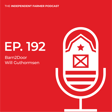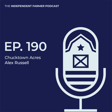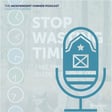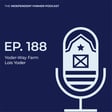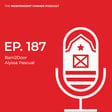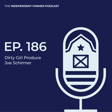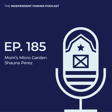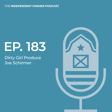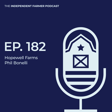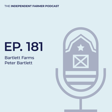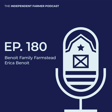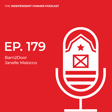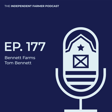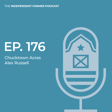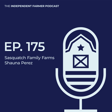Become a Creator today!Start creating today - Share your story with the world!
Start for free
00:00:00
00:00:01

How the USDA's Proposed Salmonella Framework Affects Poultry Processors
In this week's episode, James meets with Alexia of the Farm-to-Consumer Legal Defense Fund to discuss the proposed Salmonella framework from the USDA FSIS. Learn how this may affect your local poultry processor.
Make a comment by January 17th, 2025: https://www.regulations.gov/docket/FSIS-2023-0028
Learn more about the proposal: https://www.farmtoconsumer.org/actionalerts/
More Farm resources: https://www.barn2door.com/resources
Transcript
Introduction to the Podcast and Episode Focus
00:00:10
Speaker
Hello and welcome to the Independent Farmer Podcast, the go-to podcast for do-it-yourself farmers who are taking control of their own business, skipping the middleman, and selling direct to local consumer and wholesale buyers. This podcast is hosted by Barn to Door, the number one business tool for independent farmers to manage their business, promote their brand, and sell online and in person. Let's dive in to today's Independent Farmer Podcast.
00:00:42
Speaker
Welcome to the Independent Farmer Podcast. I'm James, the COO at Barnadore, and your host for today's episode. As many of our listeners may be aware, Barnadore offers an online business solution for independent farmers who are cutting out the middleman and taking control of their business, selling under their brand, and making sure their customers can purchase online and in person directly from their farm. In today's conversation, we're going to get into the USDA's proposed salmon oil framework for raw poultry products.
Alexia Kulwick and Farm Legal Services
00:01:09
Speaker
Today, I'm happy to welcome back Alexia Kulwick. She's the executive director of the Farm to Consumer a Legal Defense Fund, and Alexia helps farms all across the country understand the legal framework across various operations and now leads our Farm Legal Academy at Roger Dorff. I'm excited to dig into this topic further with Alexia about the USDA's new proposed salmonella framework and how it may affect you as an independent farmer, and specifically those raising pasture poultry. Welcome back, Alexia. It's great to see you. Yeah, great to see you. Thank you so much for having me.
00:01:38
Speaker
Well, I got to tell you, you know, when this topic was brought to my attention, I was super keen on getting you on the podcast because this is a, this is a big issue that's going to affect a lot of farms. But before we get into this issue, can you tell for our listeners a little bit more about the Farm to Consumer Legal Defense Fund? Of course, I'd love to. Yeah. So Farm to Consumer Legal Defense Fund is a nonprofit member based organization. So we encourage farms to join at FarmToConsumer.org.
00:02:04
Speaker
And we provide legal services, so direct legal consultation on a regular basis. We will do some agency defense work when farms have been accused of a notice of violation or that kind
Exploring the USDA Salmonella Framework
00:02:17
Speaker
of thing. And we do some litigation as well, but essentially helping farms and producers, food producers through the food regulatory process, which very often is very complicated, even for a very small independent producer.
00:02:31
Speaker
I can't say enough good things being a lawyer myself. I know how valuable it is to get good legal counsel. And the fact you guys have people who can represent farmers in all 50 states, right? And I think the membership, what's the annual membership cost for a farm to consumer the real defense money? $125 a year. Sorry to cut you off there James. yeah That's okay. So it's $125 a hundred and twenty five dollars year flat fee to be able to get, you know, pick up the phone, have a conversation with a lawyer who's going to give you real legal advice. Right.
00:02:57
Speaker
That's amazing. Thank you so much for all your work, and especially if the benefactors are helping underwrite and subsidize yeah the needs for small farmers. Well, let's dive into our topic today, salmonella. Specifically, before we dive into the proposed rules, let's talk about salmonella generally. like What is salmonella, number one, and why is the USDA food, safety, and inspection services, why do they even care about salmonella? Because my understanding is this is pretty naturally occurring bacteria, is that correct?
00:03:24
Speaker
Yeah, I mean, I would say salmonella is a bacteria and that what I have learned is that there's a number of different serotypes or strains of salmonella. And in fact, salmonella can cause illness. I think the idea of USDA FSIS would be to decrease the prevalence of salmonella in a food product and you will reduce human illness.
00:03:47
Speaker
One interesting thing I really found with this framework is, though, that FSIS has admitted that in the last several years it has decreased the prevalence of salmonella in poultry specifically, which has not changed the statistics on human illness. So it's sort of like a solution to the wrong problem thing going on. yeah Well, let me understand this a little bit more, right? Because salmon occurs naturally. Everybody knows you need to cook your chicken properly. And, you know, it's like, I've had a chicken, I'll never forget it, that wasn't properly cooked or rotisserie chicken. I knew it the second I ate it, but I still ate it anyways. And I remember getting food poisoning and
00:04:29
Speaker
vomiting and not feeling real well, you know, a couple of days later, I was fine, right? You know, I survived. Now, granted, I wasn't a person who had a particular illness or may have been highly susceptible that may have been more likely to, you know, have more adverse reactions, what have you. But isn't it common knowledge that you have to cook chicken well? And doesn't cooking chicken properly, doesn't it just kill this bacteria anyhow that occurs naturally? It does. And I've seen in some of the comments that have already been made to this framework,
00:04:59
Speaker
that cooking poultry thoroughly kills off any dangerous bacteria, and that the USDA, for at least the last 10 years, and probably more, but I can't speak to it, has been advising the public to cook to cook chicken thoroughly to avoid any kind of illness. So my answer would be yes, that if you cook it properly, then that it should not be a problem.
Challenges for Small Processors
00:05:26
Speaker
Okay. Well, let's start back into the rulemaking process, right? Because I know regulatory agencies can be highly political and I'm just kind of curious how this proposed rule from the USDA came to be. I'm just kind of curious. I know we're seeing all kinds of 11th hour political stunts and movers that are happening with this current administration change. I don't know if this is a political move or is this something that's been on the Docker for some time and you were expecting to come down the line? Like when was this officially proposed and put out to the public?
00:05:55
Speaker
This has sort of been bubbling for a while. And what I learned when this, when I say this, this is the current framework that we're going to be talking about. When this came out, I learned there had been a super short, broad regulatory framework published in 2022. It didn't have any of the details of the current proposed framework. So the agency has been working on the issue for a while now.
00:06:21
Speaker
You know, arguably it could still be political because the more detailed version didn't come out until last summer. So it came out, I believe, I'm sorry, I don't know the date, but it came out in summer of 2024 and had a comment period initially, I think, I believe of August through October. And then they continue to extend it first into November, then December and now January.
00:06:47
Speaker
And so now public comments to this are going to be to the framework are due January 17th. Well, I understand just again, while I'm a lawyer, I'm not a regulatory lawyer like you, right? And looking at these types of details, but I'm really curious about the language in this proposal because if salmonella is naturally prevalent and can be eliminated by proper cooking, right?
00:07:10
Speaker
I'm kind of curious how the USDA FYSIS can assert that it's quote unquote, injurious to public health, right? Like, I mean, couldn't one argue that all kinds of things are injurious to our public health in large doses, but are acceptable in small quantities? I mean, look at all the water, air, everything we breathe and eat has something that's probably not good for us. Isn't that true? I believe that's true. So this is how I would set up the discussion is that federal statute under the Poultry Products Inspection Act, there is a prohibition on the sale of food or food products that is, quote, adulterated, right? And then there is kind of a long, and you've touched on the one thing they can use, there's kind of a long laundry list of things that would make food adulterated. And the vast majority of that list are things like
00:08:01
Speaker
external materials, right? So like, if something gets into the food, that's not part of your food, you know, like... Mercury, right? No one wants to eat Mercury, right? No one wants to eat Mercury. I mean, although I will say that in a lot of foods that I'm not talking now under the Poultry Products Inspection Act. But it's acceptable, that's small level, right? But yeah, there's like, you know, junk in our ketchup and like, rat stuff and you know, whatever. But that's not how Poultry Products Act works. But I'm just saying we accept to that as a society.
00:08:29
Speaker
or at least our government agencies do. and so The statute does provide that the USDA could prohibit a deleterious substance rendered injurious to health, as you've said. right so It's this one little overbroad phrase that the USDA is utilizing to say that it can prohibit salmonella. But I would agree with you that there's a number of things out there that could be injurious to health,
00:08:59
Speaker
that we allow. But specifically, I mean, the framework here is that the Poultry Products Inspection Act does prohibit sale of adulterated food or food products, and that an adulteration can include a substance that may be injurious to health.
00:09:14
Speaker
really overly broad in my opinion, has not been used to go after pathogens like this in the past. It's been used, you know, for like external sort of foreign objects, so to speak, right? I knew of it it, again, not poultry up, but I know of a legal case where like something fell from the processing ceiling into the cans of food, right? That kind of thing is what it's really been intended to use.
00:09:38
Speaker
Well, help me understand this too. Like why is USDA, Pisces singling out poultry products versus red meat, right? Like as from from my reading on this, it only applies to poultry process. Right. Well, this is under the Poultry Products Act. And it's a great question because with red meat, there is a similar concern, not with salmonella, but with E. coli.
00:10:02
Speaker
There are regulations that would allow, you can sell product that's got some E. coli in it with the same instruction that you should be cooking, right? So I've never understood why, there's a lot of things treated differently between poultry and meat. And I cannot really speak to why we regulate this so
Regulatory Impacts and Exemptions
00:10:22
Speaker
differently. It does not make sense to me, but the claim, the USDA claim is that we still have a lot of illness in the country caused by salmonella and they want to decrease those numbers, that they have a goal of decreasing the prevalence of salmonella in the country, which frankly sounds all good and fine, but I do not believe that this proposed framework is the solution, particularly when, you know,
00:10:49
Speaker
what we want is more healthy food from the get go as opposed to having it overly processed. I mean, we can kill bacteria and a huge processing plant, but I'd rather go to the farm and get my bird. So, you know, it's it's it's not really the right solution in my opinion.
00:11:03
Speaker
Well, that gets to my next question, which is the questions about scale, right? I mean, I get this, like if I'm going into a processing plant, ah it's processing a million birds a month, high scale processor, they're probably leaching the chickens. I think just putting all kinds of garbage on there that you would never want to put in your body anyways, in the in the effort of getting rid of all bacteria and all this other damage stuff. but But if I, as an adult, you know, walk over to a neighbor or drive out to a farmer whom I know,
00:11:33
Speaker
Why is it the government's business to get between me and another adult? In fact, I may even go help them process the chicken myself. but Why should the government have any say in this? Is there any scale exemptions at all here? I mean, is there any common sense, you know, limitations here in terms of allowing people to assume the risk of what they're choosing to eat? Very little. And I do want to be clear that this proposed framework regulates processes which all processing facility plants have to implement, which would include, you know, certain testing requirements and certain HACCP plans and the like. It will not
00:12:13
Speaker
interfere with the on-farm poultry processor who is not operating a facility that has been licensed by the USDA or state, but is operating under the exemptions, it it won't impact them. This is impacting processing facilities. But that being said, it can include small processing facilities that farmers have chosen to create on their own premises,
00:12:37
Speaker
One of my big concerns and questions is they do not make clear in the proposal whether it will include custom facilities because custom facilities are in fact, you know, do have to meet certain federal requirements. They just don't have an inspector on site for each and every slaughter and processing.
00:12:57
Speaker
So to get back to your real question though, this proposed framework does not have scale appropriate provisions. And one of the biggest concerns with this proposal is that your smallest operations will not be able to afford all of these new requirements.
Legal Strategies for Small Farms
00:13:15
Speaker
Not only that, but we're basically being told we recognize some of these requirements we're putting forth in this reg may change because we're going to continue to monitor it. So we may improve our infrastructure today and then find out three years from now we need to be testing for something else. Folks just aren't going to be able to ah afford to continue that. And so the farms that are utilizing services of local nearby smaller facilities,
00:13:40
Speaker
may lose access to those facilities, right? The only thing that the regulation, and I just, you know, i I don't want to misspeak, it does provide some alleged support for the small processors in terms of helping them find somewhere free of charge to test their samples, but there's a lot more to it than that and that's just not going to be enough to save these facilities.
00:14:05
Speaker
Yeah, we won't dive into all the testing parameters because there's just way too much ambiguity right for our listeners to get into in the distance and trying to make sure it's ready from a perishability and standpoint and everything else. But let's go back to the small farm exemption right because this is really important right because we work with a lot of farmers.
00:14:21
Speaker
who have passion poultry and process on farm underneath the small farm exemption. Not a problem. This is not going to impact them. However, we also work with lots of producers who have scaled their business and gotten beyond the small farm exemption. And to your point, have either set up a processor on their own site, that's a state or custom processor, or they work with it and very closely. And maybe it could be with a co-op or directly with a custom processor in their city or county.
00:14:50
Speaker
those processors, to your point, sounds like this could create some undue burden, some, you know, requirements on them and costs potentially and that could either raise their costs or worse yet restrict their ability to conduct business. It sounds like is that correct? Yeah, absolutely. I mean, and I don't think it's just a matter of cost, although there is a matter of cost. I think that in proposing the framework FSIS doesn't address at all that these very low volume facilities, which tend to be sort of a small rural facility, maybe on farm property, that the kind of thing you're talking about, lacking access, you know, lacking access, and we won't get into it, but to the testing, lacking the resources to build the infrastructure. I mean, one of my biggest concerns is the rules require the establishment to maintain an infrastructure to submit microbial samples to the FSIS electronically.
00:15:46
Speaker
So that's, I mean, right there, you're talking about a whole set of technological changes that a small facility doesn't have right now and doesn't need. Sounds like a lab to me, like i most small processors that I've ever visited don't have on-farm labs that set up to digitally as well with digital testing equipment that, like you said, is going to send this stuff electronically. I mean, come on. That's a huge cost. This reminds me of the electronic tagging for the years.
00:16:13
Speaker
for all the cattle. Again, again a whole other burdensome cost that the USDA is trying to, again, pass on to small farmers with no small scale exemption. Well, I'm really curious. you know First off, a big part of this too is that, again, the US government's right to regulate things often extend under constitutional law underneath the commerce clause. right So there's a little bit of a question like,
00:16:35
Speaker
but is What if the birds never enter commerce, right? So is there an avenue here for some of these small production facilities to enter into your arrangements? I'm thinking like how the raw milk producers should have done it, where it might be like a herd share or a processing share or some sort of production share agreement where they become a per owner in this to navigate around.
00:16:56
Speaker
ever necessarily having the birds ever even enter into commerce? Like, are people thinking about some of these creative things or are these yet to come and waiting for the rules to land? No, I mean, I think people have been thinking about these things and there have been some folks that have done, you know, as you mentioned, we do these herd shares for dairy. I've done a couple of, quote, flock shares for people where you can do this kind of thing in poultry. I think, you know, if you are exempt from the Poultry Products Inspection Act under the 1000 or 20,000 bird exemption,
00:17:26
Speaker
You don't really need a Fox share because you don't need, you can just process one bird and sell it to someone depending on your state law. But the smaller facilities, I agree with you. I have a real concern about particularly custom slaughter facilities are already required to meet federal requirements. So even though all of that product may only be sold in state, it's being regulated by the federal government. Whether that's been ever really sort of tested or challenged, I'm not sure, but it is certainly a concern. So I do have a concern about the over breadth of this regulatory process. I do think we can come up with more creative ways like sharing some kind of a flock share, like maybe even a cooperative
00:18:13
Speaker
Facility something like that. I've seen some folks get a little bit creative. So I'm sure that there will be some creative discussions when this gets finalized. But for now, I have just I've just been working with folks that want to get these public comments in and challenge this.
00:18:29
Speaker
because certainly one of our biggest concerns is cost and expense. These facilities may close and then your local farms may not have access to the smaller facilities and your consumers may not have access to the product and even the facilities that exist for the most part to to make sure that they don't allow for the levels of salmonella that USDA is saying they might need chemical processes.
00:18:53
Speaker
Exactly.
Potential Reversal and Consumer Action
00:18:54
Speaker
That's what I don't like. Now all of a sudden they're going to compel these small processors potentially to have to start to bleach all this chicken. I mean, it's like, come on, I don't want that crap on my food. That's the last thing I want to put in my body. And I'm really curious too, again, these rules are not finalized. So I am curious, is there an avenue from your perspective for the incoming administration to potentially reverse course, because my perception is that RFK Jr., assuming he's confirmed as the USDA lead, I don't think he would look very favorably upon these type of regulatory guidelines that would you know burden or hamper local food processors, including pasture poultry. i mean and I mean, do you agree with that? Yeah, I do, actually. I think that there's, you know, the agency has issued a regulation, but I certainly think that the administration can step in.
00:19:44
Speaker
that oversee, you know, the presidential administration oversees the agencies, its executive branch, and they could step in and say, we don't want this regulation to be passed. I think that that's certainly possible. Or if it passes now, that they want to reverse it and remove it. I certainly think that's a real possibility. You know, there's one other thing, I just wanted to mention whether ah one other way in which this really harms the small facilities. That goes back to your talking about cooking. So what's interesting is the framework would deem you know poultry products that's got certain levels of certain salmonella strains in it to be considered adulterated and therefore it's unlawful to sell. But it's so unlawful to sell as a raw poultry product. But if you're a big facility and you find the salmonella, you could cook that poultry, put it in a ready to eat, put it into some kind of product instead of selling raw poultry and make money that way.
00:20:43
Speaker
For your small, really small facility, they're just trying to do a service usually for local farms, et cetera. They don't have the capacity or resources to take that product, cook it, and put it into something else. So now we're just talking about that product being wasted and thrown away, which yeah is really problematic, right? So yeah.
00:21:03
Speaker
Yeah, I can think of one farmer in particular that we have a great deal of affection. We've been working with for quite some time in Washington state, who ah was a small pasture poultry producer, got beyond the exemption and they again built out and opened up their own processor on farm. And now they service and support.
00:21:20
Speaker
lots of other local farms, right? yeah They're never going to go do all these things, right? They're not going to go build a cooking facility. They're not going to invest in computers and microbial equipment. I mean, it's just too thin margin. And and God forbid, they don't require them to have an onsite inspector. My gosh, I mean, it's just like, it just seems, again, overly burdensome. Well, from your perspective, Alexia, I'd love to hear your thoughts. I mean, you fight the good fight every day. Again, thank you so much for all the hard work at the Farm to Consumer Legal Defense Fund.
00:21:48
Speaker
What can independent farmers who are listening to this podcast today, what can they do to ensure that their concerns are heard? Yeah. So there's a couple of things. This is a proposed framework, which is interesting because usually you have a proposed regulation, but okay. It's a proposed framework that's open to public comments. Public comments are due on January 17th.
00:22:10
Speaker
So we are getting very close. I will be providing you the link to that so that folks can, I mean, and it doesn't have to be a long comment. It doesn't have to be a scientifically burdensome comment. It can just be, this appears to really harm smaller processors. And I strongly object to that. I will lose my access to small processors. It could be that simple. I'll provide that link. I think as always calling a legislator of office and letting them know that you're against this is useful.
00:22:39
Speaker
But I also think that getting these comments in right now is kind of like the thing number one that people can do. Super. Well, I really appreciate. Again, your efforts and everything you guys are doing to help raise awareness about this. We certainly will try to again shout from the bullhorn as well to try and get as many people, many farmers, not just farmers, but hopefully even buyers who care about local farms and care about maintaining access to local processors. Buyers, its consumers can also submit comments. Isn't that correct too, Alexia? Absolutely. Anyone can and from
00:23:11
Speaker
My perspective is what consumers would care about is one, I don't want bleach or chemicals used to get rid of these substances. And two, I want my local small producer to stay open, which means he or she or they may need access to these small processing facilities, right? So it's both like wanting to support this small independent production, your local producer, someone you know and trust. You can see the birds, you know how great everything is, right? Having that ability to support your local farms from the consumer standpoint, I think is so important and it's growing in importance. And yet what this framework would do, I fear would close a lot of these small facilities. And you know we're back where we were in 2020 when one problem happens at a processing plant and
00:23:58
Speaker
It's a real impact on our food supply. Bingo. Yep, going to drive up cost again and just you know scarcity leads to higher prices. And it's just shocking that we'd be trying to, again, put more restrictions in place instead of reducing the regulatory burden upon these small farmers. And bri and what i what what seems to be sort of a motivation is avoiding any presence of this pathogen at any cost, even though it increases the vulnerability of our food system that will continue to
00:24:30
Speaker
decrease the ability of local farms and communities to produce and sell their own food, which this decentralization is just so key to making positive change in our food system, I think.
Impact on Food System Decentralization
00:24:41
Speaker
So yeah, it's a problem. Well, it's interesting. I just did a quick Google search to see how many people died of salmonella in 2024.
00:24:50
Speaker
All up, according to Talley, who knows whether this is correct or not, but the AI summary says about 100 people have died. Roughly 90 people for whom information is available, 25 people hospitalized. So we're talking like fractional percentages. I think probably more people died from lightning strikes last year in America than they died from a salmonella outbreak. Not to say that there's no serious illness like fair, but I'll also point out, you just did a quick Google search. They say that poultry is the leading cause But it's still like 21% of those cases is poultry. So it could be, we see a lot of leafy greens. We see a lot of other, right? So there's, if you if you were to step back and say, and and what did poultry cause? Probably, you know, just a fraction of that. And another thing that really gets to me with this framework, they can't separate out when poultry has the salmonella.
00:25:46
Speaker
If it's from one of these large industrial plants, or if it's from one of our more local smaller facilities that's serving the community, I would hasten to guess if we had that data, it wouldn't be our small folks that are doing things correctly as opposed to having to kill pathogens, but that's me.
00:26:05
Speaker
Well, and i guess I guess every regulatory agency needs to justify their jobs right and find some something to regulate in order to preserve their purpose in life. But it seems like a a really scarce problem to be going after, particularly given that potentially Huge impacts it could have across consumers all across the country by restricting supply. So just again, unfortunate. Hopefully we'll see a reverse of course with the coming administration.
Conclusion and Resources
00:26:32
Speaker
Before we sign off, is there anything else I'd like to you'd like to add before we sign off? Yeah, you know, there's so many problems with this that I guess are more detailed than I will skip, but
00:26:42
Speaker
The other thing is there's different strains of salmonella and the framework would even prohibit the sale of some that don't fall into the strain that they think is caused by poultry, right, or or that can germinate in poultry. So ah from allies I have spoken with from a scientific basis as well, there's a lot of problems with this framework. So yeah, I hear what you're saying in terms of an agency trying to justify its existence, but I will just say that as a general rule, seeing this, you know, killing off all pathogens at any cost
00:27:15
Speaker
is just supporting this horribly unhealthy industrial food system, which everybody, well, many people are starting to recognize is really horrible, right? So yeah why are we regulating in a way that's going to continue that and exacerbate the problem, right? it's just Great feedback.
00:27:32
Speaker
I agree with you 100 percent, Alexei. Thank you so much for again, all your hard work. I want to extend my thanks to Alexei for joining us on this week's podcast episode. You can check out more from the Farm to Consumer more Legal Defense Fund on their website at www.farmtoconsumer.org. You can also follow them on Instagram at Farm to Consumer.
00:27:55
Speaker
You can learn more from Lexia by signing up for the Farm Legal Academy at barnadore.com backslash academy. We'll be having our first Farm Legal Academy in February of 2025. Thank you so much for joining us for that, Lexia. That's going to be great. Yeah, absolutely. We'll look forward to it. Here at Barnadore, we're humbled to support thousands of independent farms all across the country and delighted to offer services and tools to help farmers access more customers, increase sales, and save time. If you're an independent farmer who wants to learn more, go to barnadore.com backslash learn more.
00:28:23
Speaker
Thank you for tuning in for today's podcast and we look forward to joining you next time on the Independent Farmer podcast. Cheers.
00:28:40
Speaker
Thank you for joining us on the Independent Farmer Podcast. At Barn to Door, we are passionate about empowering independent farmers to build a thriving business. To all the farmers out there, thank you for all you do to grow amazing food, care for the soil, and serve your local communities. You are the backbone of our country. For free farm resources or to listen to prior podcasts, go to barntodoor.com backslash resources. We hope you join us again and subscribe to the Independent Farmer Podcast wherever you stream your podcasts. Until next time.
